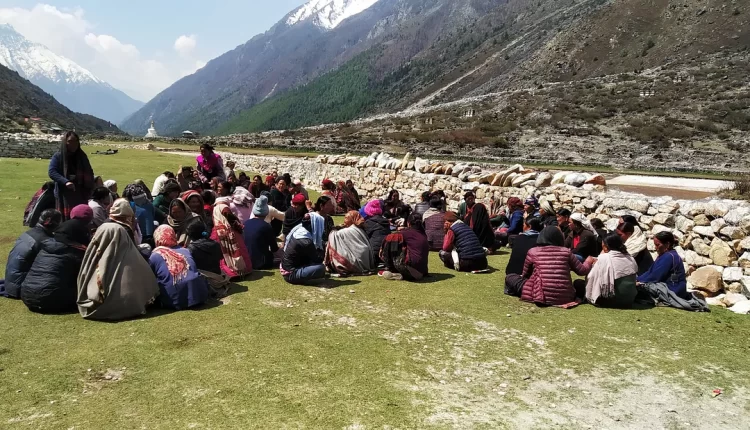Nestled in the heart of Nepal’s Karnali Province, Dullu Municipality in Dailekh, is one of those many remote villages with high hopes of breaking the shackles of poverty and underdevelopment. When the elected leaders took reins of governance in the Municipality following the 2022 local elections, the 40,000 residents of Dullu found themselves at a crossroads.
The elected people’s representatives had made their promises — fulfilling which required careful planning and budgeting. The vision was crystal clear: to engineer projects that not only harnessed inclusivity and climate resilience but also ensured productivity and created jobs for the local people.
However, the elected representatives faced a challenge as they had limited knowledge of the standard local planning process, known as the seven-step planning framework. The leaders and the Dullu residents alike knew that in the past, weak and ad-hoc planning had led to highly fragmented, small and high-risks projects which hardly brought any positive results.
“As newly elected representatives, we had only a limited grasp of the extensive planning and budgeting responsibilities shouldered by local governments. The seven-step planning framework was new to us,” remarks Bharat Prasad Rijal, Mayor of Dullu Municipality. Initially, their approach was somewhat ad-hoc. “We distributed Rs. 2.5 million ($19,000) to each Ward office, which then allocated budgets at the community level without proper planning.”
In Nepal, many local governments like Dullu have resource limitations as they rely solely on the budget provided by the federal government. The funds generated from fees and services that the municipality provides are meager. “Careful planning is key to make the best use of our limited resources, ensuring they are invested in the most productive sector,” Rijal shares.
Other municipalities have a similar story to share. “We had partial understanding of the local level planning and budgeting process. Terms like disaggregated data, gender-responsive budgeting, and bottom-up planning were unfamiliar jargon to us,” shares Dhansara Bohora, Deputy Mayor of Bheri Ganga Municipality. The Constitution of Nepal has granted local governments 22 exclusive rights and 15 concurrent rights. The Local Government Operation Act 2074 delineates a planning process for local governments. The National Planning Commission has issued the Local Level Planning Guideline 2078. Local governments, however, face a dearth of capacity to fulfill numerous legal obligations.
In response, through Local Infrastructure Support Programme (LISP-Pilot), the United Nations Development Programme (UNDP) organized a series of capacity-building sessions. Designed to impart a deep understanding of the seven-step planning process and its framework, these sessions were meant for the elected representatives and staff of 15 local governments of Karnali Province, including Dullu and Bheri Ganga, where LISP-Pilot was implemented. Furthermore, to ensure the selection of resilient, sustainable, and inclusive local infrastructure projects, the trained elected representatives and staff of the local units were mobilized. They also collected settlement-level schemes and facilitated prioritization at the Ward-level committees. The training, blended with comprehensive insights into the roles and responsibilities of elected representatives and the localization and implementation of the Sustainable Development Goals, proved beneficial.
Over a span of 13 months, more than 1,000 local stakeholders, including decision-makers from the 15 local governments underwent thorough training on the seven-step planning framework, gender-responsive budgeting and the formulation process of a Mid-term Expenditure Framework. In addition, LISP-Pilot engaged 3,377 individuals from diverse backgrounds and communities, facilitating evidence-based planning and the development of sustainable infrastructure projects that prioritize green job creation, inclusivity, resilience, and labor-intensive approaches.
“Learning the seven-step planning process in policy-making, programming, and budgeting at the local level through interactive group exercises, role-playing, and digital displays was a rewarding experience,” says Rijal.
Local government representatives say the training proved to be valuable, equipping them with the knowledge and support needed to empower them in their planning endeavors. Both Rijal and Bohora attest to its effectiveness in addressing capacity constraints in understanding the concepts, processes, and tools of the planning process. Across the 15 local governments, this initiative has also resulted in the selection of 58 community-owned projects aimed at fostering climate-resilient local infrastructure and generating green jobs. “The training also deepened our understanding of green job creation at the local level through inclusive, sustainable, and climate-resilient infrastructure services,” says Bohora.
After the training, according to Rijal, Dullu Municipality has embraced the seven-step planning process through a participatory and bottom-up approach, recognizing the importance of involving the community in the planning process. In addition, the planning process in the local governments has become increasingly inclusive with the use of social accountability tools like public hearings and the representation of individuals from diverse backgrounds in consumers’ groups. “After all, our planning must ensure a broad representation and participation,” says Bohora.
With support from the British Embassy in Kathmandu, LISP-Pilot was executed from July 2022 to July 2023 through a collaborative effort between the World Food Programme and UNDP across 15 local governments (4 municipalities and 11 rural municipalities) covering nine districts of Karnali Province. LISP’s primary objective was to pilot innovative and improved approaches or modalities that facilitate inclusive, climate-resilience and sustainable planning while executing local infrastructure projects. Additionally, it focused on creating green job prospects at the local level through testing incentive and co-financing mechanisms. The project also prioritized building capacity at the local level while simultaneously promoting the utilization of government monitoring and financing instruments.
During the LISP pilot phase, UNDP played a significant role in fostering synergy and complementarity with the Provincial and Local Governance Support Program (PLGSP), a national flagship initiative of the Government of Nepal, to effectively capitalize on the latter’s resources and expertise in order to address the needs and gaps within the local governments, along with the European Union Support to Inclusive Federalism (EUSIF).


Comments are closed.